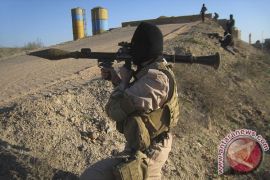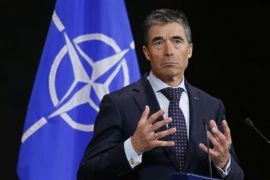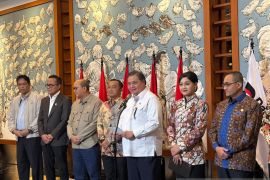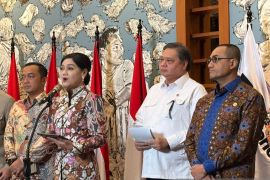We`re going to have to be vigilant generally.Baghdad (ANTARA News) - Sunni militants advanced in western Iraq and killed 21 people after security forces left several towns, while Americas top diplomat called Sunday for the countrys leaders to rise above sectarianism.
It is the latest in a series of setbacks for Iraqi forces, which are struggling to hold their ground in the face of an insurgent onslaught that has displaced hundreds of thousands of people and sparked fears that the country
could tear itself apart, told AFP.
The militants, led by the jihadist Islamic State of Iraq and the Levant (ISIL), seized the towns of Rawa and Ana after taking the Al-Qaim border crossing on Saturday, residents said.
They then gunned down 21 local leaders in Rawa and Ana in two days of violence, according to officers and doctors.
The government said its forces had made a "tactical" withdrawal from the towns, control of which allows the militants to open a strategic route to neighbouring Syria where they also hold swathes of countryside along the Euphrates river valley.
ISIL aims to create an Islamic state incorporating both Iraq and Syria, where the group has become a major force in the rebellion against President Bashar al-Assad.
Washington wants Arab states to bring pressure on Iraqs leaders to speed up government formation, which has made little headway since April elections, and has tried to convince them ISIL poses as much of a threat to them as to Iraq.
"Were going to have to be vigilant generally," U.S. President Barack Obama said in an interview aired Sunday on CBS.
ISIL spillover
Obama said that while ISILs offensive in could destabilise other countries in the region and "could spill over into some of our allies like Jordan."
"They are engaged in wars in Syria where -- in that vacuum thats been created -- they could amass more arms, more resources."
U.S. leaders have stopped short of calling for Shiite Prime Minister Nuri al-Maliki to step down, but there is little doubt that they feel he has squandered the opportunity to rebuild Iraq since US troops withdrew in 2011.
The seizure of Al-Qaim leaves just one of three official border crossings with Syria in federal government hands. The third is controlled by Kurdish forces.
Militants already hold areas of the western desert province of Anbar which abuts the Syrian border, after capturing this year all of one city and parts of another.
Near Anbar capital Ramadi, parts of which are held by anti-government fighters, a suicide bombing and a car bomb killed six people and wounded eight, officials said.
Elsewhere, a government air strike on the militant-held city of Tikrit, killed at least seven people, residents said, while the defence ministry announced air raids on the northern city of Mosul.
The insurgents also clashed with security forces and pro-government tribal fighters in Al-Alam east of Tikrit, with militants killing the womens affairs adviser to the provincial governor.
The fighting came as U.S. Secretary of State John Kerry arrived in Cairo on a trip to the Middle East and Europe, with Washington aiming to unite Iraqs fractious leaders and repel the militants.
Rise above sectarianism
"We must urge Iraqs leaders to rise above sectarian considerations... and speak to all people," Kerry said in Cairo, adding that Washington is not responsible for the current crisis.
Kerry later travelled to Jordan, and will also visit Brussels and Paris, where Washington is also expected to push for greater efforts to cut off funding to ISIL.
"First and foremost, we are urging countries that have diplomatic dealings with Iraq and that are in the region to take that threat as seriously as we do," said a State Department official.
"Second, we are underscoring the need for Iraqi leaders to expedite their government formation process and to come together around a new government that is inclusive."
Kerry is expected to travel to Iraq for his second visit since taking over as secretary of state in 2013 but the date is not known.
Washington backed Maliki when he first became premier in 2006, as he was seen to be cracking down on Shiite militias while reaching out to Sunni leaders.
But he has since made what critics say are increasingly sectarian moves, triggering U.S. calls for him to represent all Iraqis, particularly minority Sunni Arabs and Kurds.
Obama has offered to send up to 300 military advisers to Iraq, but has so far not backed air strikes as requested by Baghdad.
U.N. aid agencies are rushing supplies to Iraq to help more than one million displaced people.
(H-AK)
"We must urge Iraqs leaders to rise above sectarian considerations... and speak to all people," Kerry said in Cairo, adding that Washington is not responsible for the current crisis.
Kerry later travelled to Jordan, and will also visit Brussels and Paris, where Washington is also expected to push for greater efforts to cut off funding to ISIL.
"First and foremost, we are urging countries that have diplomatic dealings with Iraq and that are in the region to take that threat as seriously as we do," said a State Department official.
"Second, we are underscoring the need for Iraqi leaders to expedite their government formation process and to come together around a new government that is inclusive."
Kerry is expected to travel to Iraq for his second visit since taking over as secretary of state in 2013 but the date is not known.
Washington backed Maliki when he first became premier in 2006, as he was seen to be cracking down on Shiite militias while reaching out to Sunni leaders.
But he has since made what critics say are increasingly sectarian moves, triggering U.S. calls for him to represent all Iraqis, particularly minority Sunni Arabs and Kurds.
Obama has offered to send up to 300 military advisers to Iraq, but has so far not backed air strikes as requested by Baghdad.
U.N. aid agencies are rushing supplies to Iraq to help more than one million displaced people.
(H-AK)
Editor: Ella Syafputri
Copyright © ANTARA 2014








